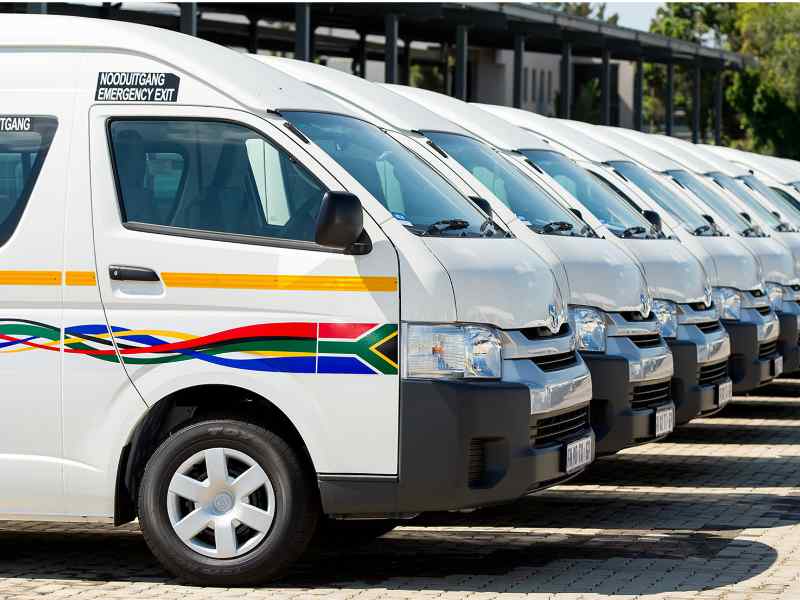SA Taxi sign $100 million loan agreement to enhance transport sector, boost industrialization
To help alleviate the pains of the ongoing lockdown on small businesses, The African Development Bank and SA Taxi Development Finance Proprietary Limited, a wholly owned subsidiary of SA Taxi Holdings Proprietary Limited have signed a $100 million loan agreement to support the firm’s growing strategy to empower taxi operators with limited access to finance from traditional financiers. The loan agreement, which carries an eight-year tenor and includes a six-month grace period, was entered into between the Bank’s Director of Infrastructure & Urban Development Amadou Oumarou, and Lorenzo Cardoso, Chief Financial Officer and Director of SA Taxi. “The funding transaction entered into with the African Development Bank is instrumental to SA Taxi’s medium and long term strategy. The tenor and size of the transaction will contribute towards the continued success of SA Taxi to empower SMEs and create opportunities that ensure the sustainability of the minibus taxi industry,” Cardoso said. “We are proud to be an internationally recognised African business.”

The financial package, comprising a senior loan of $10 million and an associated facility of ZAR 1.4 billion (about $97 million), will provide a powerful boost to industrialization through improved urban mobility for working class South Africans. SA Taxi is a vertically integrated minibus taxi platform utilizing specialist capabilities, enriched proprietary data and technology, to provide developmental finance, insurance and other services to empower Small and Medium Enterprises (SMEs), thus enabling the sustainability of the minibus taxi industry.
Read also : South African Healthcare Startup Ingress Healthcare Raises $317k To Help Scale Its Platform
In addition to minibus vehicle retail and financing services, SA Taxi also provides specialized minibus taxi insurance, vehicle tracking, maintenance, and refurbishment services to taxi operators through SA Taxi Auto Repairs and SA Taxi Protect, its wholly-owned subsidiaries. While approximately 80% of SA Taxi clients are unbanked and may not ordinarily qualify for the formal banking sector, under the Bank’s financing arrangement, approximately 25% of direct beneficiaries will continue to be women and approximately 22 % will be youth under 35 years old. The Bank’s facility is expected to contribute a significant component of SA Taxi’s funding requirement over the next three years.
Read also : South Africa is the largest wealth market on the African continent
Oumarou described the signing as an exciting new chapter in the Bank’s partnership with SA Taxi that would bring real and tangible benefits to the people of South Africa with the prospect of scaling up this model to other African countries that are facing significant urban public transportation challenges. “The evolving public transportation systems with para-transit minibuses filling the market segment between private taxis and municipal bus transit, is key to achieving South Africa’s economic success and social progress,” Oumarou, said. “Therefore, the Bank is proud to be supporting the SA Taxi Group in its pioneering efforts to positively shape the ecosystem of public transportation services in South Africa.”
Read also : Johann Rupert ’s Fund Begins To Disburse Minimum of $1300 Each To South African Businesses Today
Up to 90 % of vehicles financed by SA Taxi are manufactured in South Africa, a powerful boost to industrialization. This makes the loan facility consistent with the Bank’s Ten-Year Strategy (2013 – 2022) and Country Strategy Paper for South Africa 2018-2022, as well as two of its High 5 priorities: Industrialize Africa and Improve the Quality of Life for the People of Africa. The Bank’s funding will ultimately support SA Taxi’s continued investment in the taxi industry and its strategy of enabling taxi operators to replace old vehicles with newer, safer and lower emission minibus taxis.
Kelechi Deca

Kelechi Deca has over two decades of media experience, he has traveled to over 77 countries reporting on multilateral development institutions, international business, trade, travels, culture, and diplomacy. He is also a petrol head with in-depth knowledge of automobiles and the auto industry

